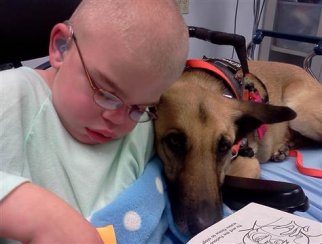 |
Thursday, 29 March 2012
Researchers in Ohio are studying the power of pee
Mood:
 a-ok
Topic: Strange but True a-ok
Topic: Strange but True

Researchers at Ohio University are studying a new energy source you can produce yourself. They’re studying the power of pee. It’s something everyone does, every day. Even though urine is nearly 99 percent water, there is a lot of hydrogen in the remaining one percent from an organic compound called urea. To break it down, if you could collect the urine from all 24,000 students at Ohio University, you could power 60 buildings every day. Researchers say there is still a lot of work to be done, but there are some applications of this new technology that could start paying off for businesses very soon. Until then, our “number one” power source will just keep going down the drain. Article Source - kshb.com
Posted by Neil Bartlett DHyp M.A.E.P.H
at 01:01 MEST
Updated: Thursday, 29 March 2012 01:07 MEST
Wednesday, 28 March 2012
Listening to Mozart doubles survival rates after a heart transplant
Mood:
 bright
Topic: Alternative Health bright
Topic: Alternative Health

Listening to Mozart improves the outlook for mice undergoing heart transplants, a study has found. Verdi had the same effect, increasing the time before the organs failed - but New Age music from Enya had no impact. Scientists traced the response to the spleen, where changes occurred to levels of immune system signalling molecules and cells. The Japanese researchers were unable to say whether music could influence organ rejection in humans. But they pointed out that music was known to reduce stress, enhance relaxation, distract from pain and improve the results of clinical therapy. Full Story from dailymail.co.uk
Posted by Neil Bartlett DHyp M.A.E.P.H
at 01:01 MEST
Updated: Wednesday, 28 March 2012 01:42 MEST
Tuesday, 27 March 2012
10 Points About the Science of Spreading Good
Mood:
 bright
Topic: Inspirational bright
Topic: Inspirational

1. Good deeds are contagious We naturally imitate the people around us, we adopt their ideas about appropriate behavior, and we feel what they feel. Acts of charity are no exception. In our 2010 generosity experiment, we showed that every extra dollar of giving in a game designed to measure altruism caused people who saw that giving to donate an extra twenty cents. 2. The network acts like a matching grant That same experiment showed that contagious generosity spreads up to three steps through the network (from person to person to person to person), and when we added up all the extra donations that resulted at every step, we found that an extra dollar in giving yielded three extra dollars by everyone else in the network. 3. Messages get amplified when they spread naturally People are bombarded by information and appeals every day, especially in our newly mobile and tech-centered society, so the effect of any one appeal to do a good deed may get lost. But don't underestimate the effect of a broadcasting strategy. Our research on get-out-the-vote appeals suggests that the indirect effect of a message on a person's friends is about three times larger than the direct effect on the person who received the message in the first place. The more you can get people to deliver the message naturally, the greater this multiplier effect will be. 4. Close friends matter more When we studied behaviors like obesity, smoking, and drinking, we found that spouses, siblings, and friends had an effect on each other's behavior, but next door neighbors did not. So any attempt to change people's behavior should probably focus on motivating these "strong ties" rather than broadcasting to a wide range of weak connections. 5. Our real world friends are online, too Although most relationships online are not strong (the average person on Facebook has 150 "friends"), we do tend to be connected to our closest friends online too. Therefore, it is possible to use online social networks to reach our real world friends to spread social good. If someone is suggesting friends to a person who could help spread the world, it is important to try to figure out which of his/her relationships are also likely face-to-face. We have done this using photo tags and frequency of communication online, both of which work relatively well. 6. Make good behavior visible… An experimental study of donations to an NPR pledge drive showed that people donate more when the caller was told about someone else's donation. 7.… but don't overdo it! That same study found that when callers heard about an extremely large donation, they opted not to donate at all themselves because they did not want to look "cheap." There is a sweet spot – too low, and it will drag down the average donation, too high and people will not donate at all. In that study they found that the message to optimize donations was one that revealed a donation size at the 90th percentile, in other words, a donation that was bigger than about 90 percent of all donations, but smaller than the other ten percent. 8. Centrality, interest, influence, and influence-ability are all important A natural implication of network science is that people with more friends and friends of friends are important because they are more "central" (a smaller number of steps from everyone else in the network). But, as we argue here, to maximize contagion, they must be 1) interested in spreading social good, 2) influential, and can persuade others, and 3) influence-able by their friends (they are persuadable). Without these other characteristics, even the most connected person won't be of any help. 9. Central actors can also help predict the future In our 2011 flu study we showed that people with more friends tend to be affected by things spreading through the network before other people (on average, they got the flu two weeks earlier than others). This means that central actors can also be used as bellwethers to monitor the progress of a social good campaign. 10. Realize your network power Everything we do ripples through our network. If you feel better because you did a good deed, this will have a positive effect on your friends, your friends' friends, and even your friends' friends' friends. Your own positive change can affect hundreds of people. And who wouldn't want to make his/her corner of the vast human social network a better place? by James Fowler Article Source - dailygood.org
Posted by Neil Bartlett DHyp M.A.E.P.H
at 01:01 MEST
Updated: Tuesday, 27 March 2012 01:36 MEST
Monday, 26 March 2012
Mysterious UFOs Caught on camera in UK and France
Mood:
 bright
Topic: UFO's & Aliens bright
Topic: UFO's & Aliens
A mysterious, flashing UFO was caught on video by UK Skywatch. What is it? The unidentified flying object, when lit, looks like any other star in the background of a time-lapse video of the night sky over the UK. But, unlike any other object nearby, this one flashes on and off at roughly one-minute intervals. Such behavior is commonly caught on tape by known aircraft making its way through the sky. But this UFO blinks on and off, flashing brilliantly for just a second at a time. Full Story from gather.com Meanwhile.....A strange, blue, quadrangle-shaped UFO was filmed over Volvic, France, expanding before zooming out of view. What is it? The unidentified flying object was caught looking out a window and, at first, seems to be a reflection. But soon the object begins to expand into quadrants and begin dancing through the sky. Evolving from a pair of blue lights, they eventually split and form a rectangular shape before dipping out of frame and out of view. Full Story from gather.com
Posted by Neil Bartlett DHyp M.A.E.P.H
at 01:01 MEST
Updated: Monday, 26 March 2012 01:17 MEST
Sunday, 25 March 2012
Mute autistic man stuns experts with his amazing singing voice
Mood:
 bright
Topic: Inspirational bright
Topic: Inspirational
A man with autism that has rendered him almost mute is about to release an album after he was found to have perfect pitch and an amazing singing voice. Kyle Coleman, 25, from Gwithian, Cornwall, was diagnosed with autism at the age of three and has only ever been able to say a few words. However, his talent was discovered after his mother Caroline took him to a music therapy session in 2009. Full Story from dailymail.co.uk
Posted by Neil Bartlett DHyp M.A.E.P.H
at 01:01 MEST
Updated: Sunday, 25 March 2012 02:59 MEST
Saturday, 24 March 2012
The Evolution of the Moon
Mood:
 chatty
Topic: Moon chatty
Topic: Moon

From year to year, the moon never seems to change. Craters and other formations appear to be permanent now, but the moon didn't always look like this. Thanks to NASA's Lunar Reconnaissance Orbiter, we now have a better look at some of the moon's history. Learn more in this video!
Posted by Neil Bartlett DHyp M.A.E.P.H
at 01:01 MEST
Updated: Saturday, 24 March 2012 03:04 MEST
Friday, 23 March 2012
The Denbigh Ghost and UFO Sightings
Mood:
 bright
Topic: Paranormal bright
Topic: Paranormal
It seems the ancient, rural village of Denbigh Town, in North Wales, UK, is a hotspot for paranormal activity, boasting both UFO and ghost sightings hovering over the countryside and lurking among the ruins. Can it be true? In the YouTube video below, an unidentified resident of the town has photographed several instances of both apparitions haunting ancient ruins and unidentified flying objects floating in the sky. Full Story from news.gather.com
Posted by Neil Bartlett DHyp M.A.E.P.H
at 01:01 MEST
Updated: Friday, 23 March 2012 02:12 MEST
Thursday, 22 March 2012
A dying boys special bond with a rescue dog
Mood:
 chatty
Topic: Inspirational chatty
Topic: Inspirational

Tennessee dad had a gut feeling that he could train the shepherd to help his son, 4 As nearly anyone who has adopted a dog or cat from a shelter can attest, there’s something special about a rescued pet; it’s as if the animal senses he’s been given a second chance at life. That’s certainly the case with Juno, a Belgian Malinois who was rescued from a shelter just days before she was to be euthanized. But since coming to live with her family in Alcoa, Tenn., Juno has taken on the role of rescuer to four-year-old Lucas Hembree. Lucas suffers from Sanfilippo syndrome, an inherited, metabolic disease caused by the absence or malfunctioning of an enzyme needed to break down long sugar molecules. As the disease progresses, children lose the ability to speak, walk and eat. The disease also causes severe neurological damage that leads to aggressive behavior, hyperactivity and seizures. “The most catastrophic thing parents hear when they learn their child has this disease is that there’s no cure or treatment available,” says Lucas’ father, Chester. Unless that changes, Lucas isn’t expected to live past the age of 15 and may be in a vegetative state by the time he is eight. Realizing that every moment is extra precious, Chester and his wife, Jennifer, want their son to experience as much as he can while he still has the capacity to enjoy it.
Prayer and persistence So when the disease started to take a toll on Lucas’ joints, Chester looked into getting a service dog to keep Lucas steady when he walked. “I was told that a service dog would cost at least $15,000, and that Lucas wasn’t a good candidate because of his deteriorating abilities and his behavior,” Chester says. “I refused to accept this answer.” A combination of prayer and persistence led Chester to Juno. “I came across a posting about her on a rescue group’s website,” he says. “I had the feeling in my gut that I had to go see this dog.” The whole family made the two-hour trip to meet Juno, who was being held at an east Tennessee shelter. “She was emaciated, and was days away from being euthanized,” Chester says. “She had been surrendered to the shelter because her previous owners didn’t understand the Belgian Malinois.” Fortunately, Chester did. He’d gotten to know and love the breed while working as a law enforcement officer years earlier. “I used to help with the training of police K-9s, and our dogs were Belgian Malinoises,” he says. “I loved their desire to work and their ‘never quit’ attitude.” In addition to being a popular choice for police dogs, the breed is often used in combat. In fact, it’s believed that the dog that helped Navy SEALs take down Osama bin Laden was a Belgian Malinois. Showered with love and affection But while the breed has proven its prowess on patrol and in combat, Chester needed to be sure Juno would be a suitable service dog for his little boy. “I put her on a loose leash and she walked with me and never pulled,” Chester says. “Next came the Lucas test. They took to each other immediately, like kindred spirits.” The Hembrees brought Juno home and showered her with love and affection. “I wanted to make sure she had plenty of time to adjust to the family before I started the formal training,” Chester says. Yet, from the beginning there seemed to be something instinctive about their relationship. One day, Chester noticed Juno circling Lucas while he was in his wheelchair. “She was whining and nudging him with her nose,” Chester says. “I checked his oxygen levels and they were very low.” After giving him oxygen, Lucas returned to normal and Juno greeted him with licks and affection. “That’s when I knew she had the ability to pick up on his neurological changes,” Chester says. “Now she alerts us when Lucas is about to have a seizure or if his oxygen levels drop really low. She has saved him several times." Juno has become a literal shoulder for Lucas to lean on when walking, and a calming influence when he’s agitated. And while Chester makes sure that Juno gets time off, he says that it’s hard to get Juno to leave Lucas’ side. “You don’t see one without the other close by,” he says. “It really feels like it was meant to be.”
To learn more about Lucas you can go to the Facebook page that his dad writes from Lucas' perspective. Article Source - dailygood.org
Posted by Neil Bartlett DHyp M.A.E.P.H
at 01:01 MEST
Updated: Thursday, 22 March 2012 02:42 MEST
Wednesday, 21 March 2012
Choose a healthy lifestyle to help with menopause symptoms
Mood:
 happy
Topic: Alternative Health happy
Topic: Alternative Health

It's understandable that a woman would like to avoid discomfort while going through menopause. After all, what woman likes having hot flashes or experiencing vaginal dryness? The problem, though, is that taking hormones is not the answer. Natural News has covered the multiple dangers of hormone replacement therapy (HRT), warning women that HRT can possibly cause asthma, ovarian and breast cancer, and other unwanted ailments. Avoiding a hot flash is not worth the trade for breast cancer. So what can women do to ease the symptoms of menopause while staying safe? There are a few natural remedies that won't leave women worse off than when they started. Regular exercise According to Patient UK, regular exercise can be a good way to manage the symptoms of menopause. The site recommends aerobic activities that involve sustained effort, like swimming. Weight-bearing exercise can also be beneficial and could help combat osteoporosis later in life as well because this kind of exercise helps build bone. Yoga can be helpful because of its relaxing effect on the body. Also, because regular exercise can help with general overall physical and mental health, this alone might be all a woman needs to do to feel better during the change. Healthy eating habits Like exercise, healthy eating habits are something that will benefit a woman regardless of what stage of life she's in. However, it's best to avoid some of those items that often wind up on "bad" food lists. Such foods to avoid would include foods high in sodium, as well as food and beverages with caffeine, sugar and alcohol. It also might help to cut out spicy and processed foods. Holistic Online recommends that menopausal women focus on consuming foods that are high in fiber and low in fat because those foods will help the body adjust to its new state more quickly. Obviously, one of the best ways to get lots of fiber while decreasing the fat in one's diet is to eat more plant-based foods, such as leafy green vegetables, beans, sea vegetables, and fruits and vegetables high in antioxidants. Herbal remedies Many women would prefer an herbal remedy to a pill. Fortunately, there are a variety to choose from that offer different benefits. For example, some herbs might be helpful because, by putting relatively low doses of plant hormones in the body, they can counteract some of the symptoms menopause can cause. Primrose oil is one such herbal remedy. Studies have suggested that black cohosh might also be effective at minimizing hot flashes. Other remedies include herbs like ginseng and gingko biloba. No one says women should have to suffer through menopause, but why should a woman suffer from damage caused by treating those symptoms with HRT? A healthy lifestyle, including eating nutritious foods and exercising, supplemented with herbal remedies, might be the safest way to combat menopause. Article Source - naturalnews.com
Posted by Neil Bartlett DHyp M.A.E.P.H
at 01:01 MEST
Updated: Wednesday, 21 March 2012 02:06 MEST
Tuesday, 20 March 2012
The Ghost of Herne Bay Pier
Mood:
 bright
Topic: Paranormal bright
Topic: Paranormal
Ghost stories abound around the old Herne Bay Pier near Kent, England, ever since a violent storm isolated the pier head out at sea in 1979. Since then, many reports of a ghostly figure shuffling back and forth have chilled the spine. Now, a new video offers up some real proof to back up the tale. Full Story from news.gather.com
Posted by Neil Bartlett DHyp M.A.E.P.H
at 01:01 MEST
Updated: Tuesday, 20 March 2012 03:54 MEST
Newer | Latest | Older
|
|







